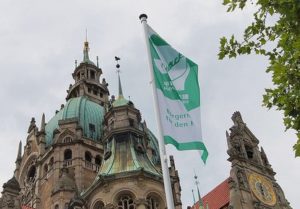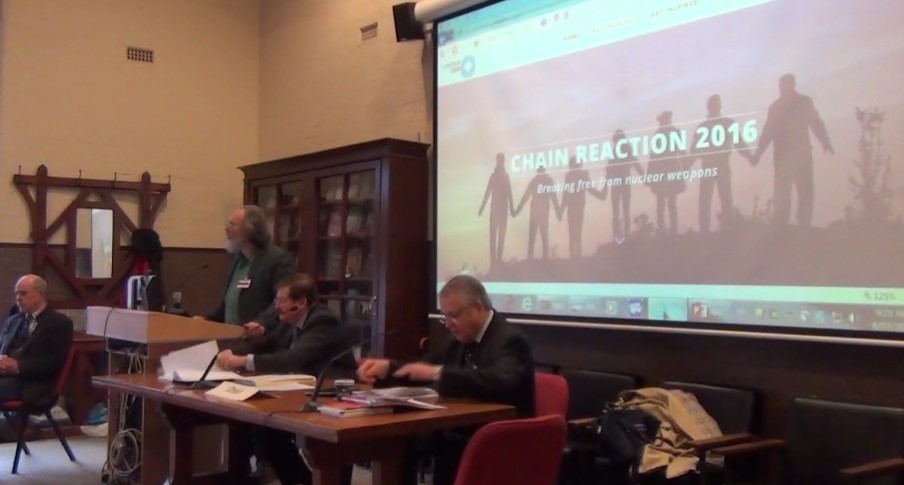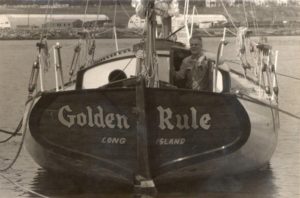Chain Reaction 2016, a series of nuclear disarmament events around the world, kicked off on July 8 with events in Australia, Austria, Germany, Italy, New Zealand, the United States and other places.
On this date in 1996, the International Court of Justice (ICJ) affirmed that the threat or use of nuclear weapons is generally illegal and that there is an unconditional obligation to negotiate for their complete elimination. Chain Reaction 2016 includes actions to implement this historic decision.
Austria and Germany: Flag events in 207 cities
207 cities in Austria and Germany raised the Mayors for Peace nuclear disarmament flag on July 8 to commemorate the 20th anniversary of the ICJ case and to promote global nuclear abolition. The Flag day events were coordinated by the City of Hanover, with the support of a number of German non-governmental organisations. Click here to see photos of Flag Day events. Click here to see a video of the Stuttgart event.

‘We, the Mayors for Peace, are very concerned that there still exist around 16,000 nuclear warheads in the world,’ said Stefan Schostok, Mayor of Hanover and a Vice-President of Mayors for Peace. ‘A world that is increasingly marked by numerous violent conflicts, acts of war and terrorism. A world that seems to go off the rails. In view of the planned deployment of new, technically upgraded nuclear weapons in Europe, it is therefore all the more important that Flag Day draws attention to the goal of a nuclear-free world.’
The Flag Day events also focused on the United Nations Open Ended Working Group on Taking Forward Multilateral Nuclear Disarmament Negotiations (OEWG). ‘With the hoisting of the Mayors for Peace banner in front of our City Hall will appeal also to the governments of the world to actively and seriously in the OEWG discussions on nuclear disarmament,’ said Mayor Schostok.
Australia: Chain Reaction 2016 launched at Peoples’ Tribunal
Chain Reaction 2016 was officially launched in Sydney, Australia on July 8 during an International Peoples’ Tribunal on Nuclear Weapons and the Destruction of Human Civilisation.
The Tribunal, hosted by the University of Sydney Centre for Peace and Conflict Studies, was hearing charges laid against the leaders of the nuclear-armed States and the leader of Australia for crimes against humanity, peace and future generations. ‘The Tribunal highlights the responsibility of leaders of nuclear armed States and those under extended nuclear deterrence doctrines to end the illegal threat nuclear weapons pose to human civilization,’ says John Hallam, one of the Tribunal organisers.

‘In 1996 the ICJ affirmed that the threat or use of nuclear weapons is generally illegal, and that there is an unconditional obligation to achieve their elimination,’ said Hon Matt Robson, former New Zealand Minister of Courts and one of the Tribunal judges. ‘Today in the Peoples’ Tribunal we have heard frightening testimony on the current risks and the catastrophic consequences of nuclear weapons use, as well as international law applicable to this issue. We will make a judgement on the responsibility of world leaders with regard to this situation on August 9, the 71st anniversary of the use of nuclear weapons against the city and people of Nagasaki’.
Italy: Florence lawyers highlight Italy’s violation of the ICJ opinion
On July 8, lawyers in Florence released a statement recalling the 1996 ICJ advisory opinion and highlighting violations by the Italian government of the opinion. The statement refers in particular to Italy hosting U.S. nuclear weapons at the military bases of Aviano and Ghedi. The statement notes that the threat or use of nuclear weapons, which is inherent in their deployment in Italy, constitutes a crime against humanity and possibly even a crime of genocide. The statement calls on courts – including Italian courts – to adjudicate on this issue prior to any catastrophic use of nuclear weapons, as to wait until they are used would be too late.
New Zealand: Former Prime Ministers join commemoration
In New Zealand, two former Prime Ministers Sir Geoffrey Palmer and the Hon Jim Bolger were among the expert speakers at a symposium at the University of Canterbury.
Sir Geoffrey was the acting Prime Minister in 1985 when the United States tried to send a nuclear-capable warship to New Zealand in violation of New Zealand’s fledgling anti-nuclear policy. New Zealand stood strong against the U.S. pressure, and finally the U.S. is prepared to accept this anti-nuclear policy.
Mr Bolger was the conservative Prime Minister of New Zealand when the nuclear weapons case was taken to the ICJ in 1994 (New Zealand and San Marino were the only two Western countries to vote in favour of the UN resolution taking the case). Both former prime ministers are active in the Asia-Pacific Leadership Network for Nuclear Non-proliferation and Disarmament.
Other speakers included Dr Kate Dewes, Commander Robert Green, Dr George Salmond, Pauline Tangiora and Professor Roger Clark – all of whom played leading roles in the 1996 ICJ case.
USA: Public readings of the ICJ decision in Michigan and Knoxville
In Michigan, Straits Area Concerned Citizens of Peace organised a public reading of the 1996 ICJ decision in downtown Mackinaw. The group also covered old military cannons with key phrases from the ICJ decision including the unanimous finding that “There exists an obligation to pursue in good faith and bring to a conclusion negotiations leading to nuclear disarmament in all its aspects. . . “
In Knoxville, members of the Oak Ridge Environmental Peace Alliance organised a reading of the 1996 ICJ decision at the University of Tennessee Law School.
USA: Golden Rule educational event in Kenmore
The Golden Rule sailboat, currently on an anti-nuclear voyage along the west coast of the United States, organised a special educational event in Kenmore WA library on July 8.

In 1958, the Golden Rule sailed from San Pedro toward Eniwetok atoll in the Marshall Islands, to protest against U.S. nuclear tests there. Their example helped to ignite a storm of world-wide public outrage against nuclear weapons that resulted in the Limited Nuclear Test Ban Treaty of 1963. Six years ago the Golden Rule was retrieved from the bottom of Humboldt Bay, renovated by Veterans for Peace, and has begun sailing again for a nuclear-weapon-free world.
‘Nuclear war remains a real danger‘ says Gerry Condon, Vice-President of Veterans for Peace. ‘Nuclear weapons continue to threaten all life on earth, as does catastrophic climate change. The Golden Rule is calling on us all to take action for peace and sustainability before it is too late.’Asics Onitsuka Tiger

